Fridericus Rex (Arzén von Cserépy, 1922-1923) was a series of four biographical films with Otto Gebühr as the eighteenth century monarch Friedrich II (Frederic II). It started the Prussian films cycle, historical films made in Germany during the Weimar (1918–1933) and Nazi (1933–1945) eras. The films were noted for their glorification of Prussian history and its military, and are set during the eighteenth and nineteenth centuries. The Prussian films were extremely popular with German audiences and an estimated forty four were produced by the end of the Second World War.
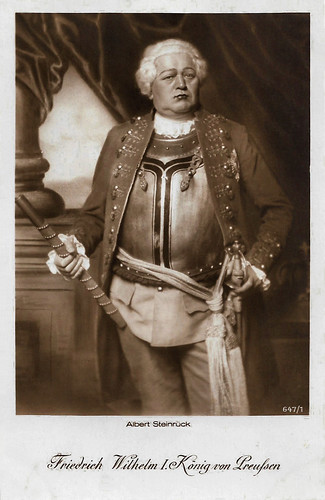
German postcard by W.J. Morlins, Berlin / Ross Verlag, Berlin, no. 647/1. Photo: Karl Schenker / Cserépy-Film Co. Publicity still of Albert Steinrück as Friedrich Wilhelm I, King of Prussia, the father of Frederick the Great, in Fridericus Rex (Arzén von Cserépy, 1922-1923).
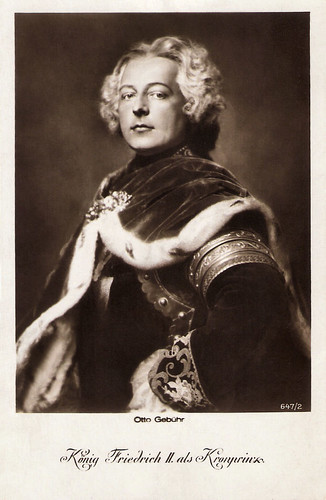
German postcard by W.J. Morlins, Berlin / Ross Verlag, Berlin, no. 647/2. Photo: Karl Schenker / Cserépy-Film Co. Publicity still of Otto Gebühr as Crown Prince Frederick for Fridericus Rex (Arzén von Cserépy, 1922-1923).
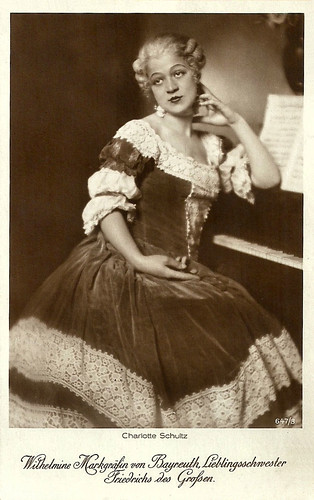
German postcard by W.J. Morlins, Berlin / Ross Verlag, Berlin, no. 647/3. Photo: Karl Schenker / Cserépy Film Co. Publicity still of Charlotte Schulz as Wilhelmine, Marchioness of Bayreuth, favourite sister of Frederick the Great, in Fridericus Rex (Arzén von Cserépy, 1922-1923).
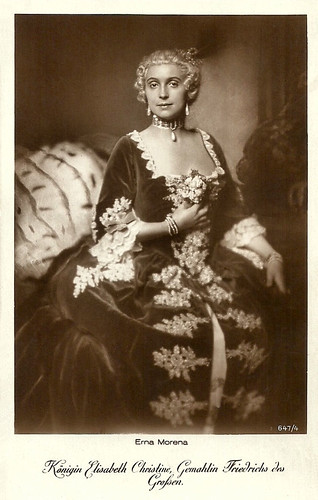
German postcard by W.J. Morlins, Berlin / Ross Verlag, Berlin, no. 647/4. Photo: Karl Schenker / Cserépy-Film Co. Publicity still of Erna Morena as Queen Elisabeth Christine, spouse of Frederick the Great, in Fridericus Rex (Arzén von Cserépy, 1922-1923).
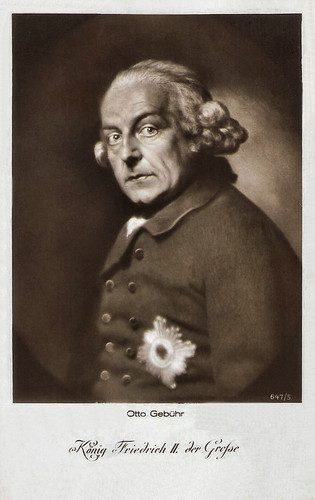
German postcard by W.J. Morlins, Berlin / Ross Verlag, Berlin, no. 647/5. Photo: Karl Schenker / Cserépy-Film Co. Publicity still of Otto Gebühr as King Frederick the Great in Fridericus Rex (Arzén von Cserépy, 1922-1923).
Friedrich II or in English Frederick II (1712-1786) was King of Prussia from 1740 until 1786, the longest reign of any Hohenzollern king. His most significant accomplishments during his reign included his military victories, his reorganisation of Prussian armies, his patronage of the arts and the Enlightenment, and his final success against great odds in the Seven Years' War. Frederick was the last Hohenzollern monarch titled King in Prussia and declared himself 'King of Prussia' after achieving sovereignty over most historically Prussian lands in 1772. Prussia had greatly increased its territories and became a leading military power in Europe under his rule. He became known as 'Frederick the Great' (Friedrich der Große), and was nicknamed 'Der Alte Fritz' (The Old Fritz) by the Prussian people, and eventually the rest of Germany.
In his youth, Frederick was more interested in music and philosophy than the art of war. Nonetheless, upon ascending to the Prussian throne, he attacked Austria and claimed Silesia during the Silesian Wars, winning military acclaim for himself and Prussia. Toward the end of his reign, Frederick physically connected most of his realm by acquiring Polish territories in the First Partition of Poland. He was an influential military theorist whose analysis emerged from his extensive personal battlefield experience and covered issues of strategy, tactics, mobility and logistics.
Considering himself 'the first servant of the state', Frederick was a proponent of enlightened absolutism. He modernised the Prussian bureaucracy and civil service and pursued religious policies throughout his realm that ranged from tolerance to segregation. He reformed the judicial system and made it possible for men not of noble stock to become judges and senior bureaucrats. Frederick also encouraged immigrants of various nationalities and faiths to come to Prussia. Some critics, however, point out his oppressive measures against conquered Polish subjects during the First Partition. Frederick supported arts and philosophers he favoured, as well as allowing complete freedom of the press and literature. Frederick is buried at his favourite residence, Sanssouci in Potsdam. Because he died childless, Frederick was succeeded by his nephew, Frederick William II, son of his brother, Augustus William.
Nearly all 19th-century German historians made Frederick into a romantic model of a glorified warrior, praising his leadership, administrative efficiency, devotion to duty and success in building up Prussia to a great power in Europe. Historian Leopold von Ranke was unstinting in his praise of Frederick's "heroic life, inspired by great ideas, filled with feats of arms ... immortalised by the raising of the Prussian state to the rank of a power". Johann Gustav Droysen was even more extolling. Frederick remained an admired historical figure through the German Empire's defeat in the First World War. The Nazis glorified him as a great German leader pre-figuring Adolph Hitler, who personally idolised him. Associations with him became far less favourable after the fall of the Nazis, largely due to his status as one of their symbols.
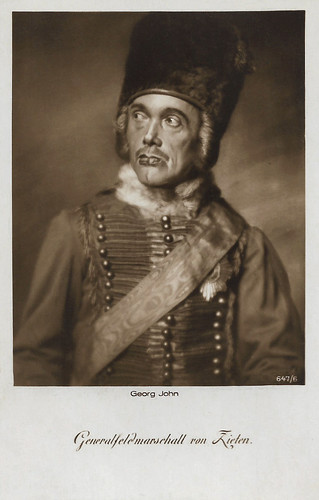
German postcard by W.J. Morlins, Berlin / Ross Verlag, no. 647/6. Photo: Karl Schenker / Cserépy-Film Co. Publicity still for Georg John as Generalfeldmarschall von Zieten (Field Marshal von Zieten) in Fridericus Rex (Arzén von Cserépy, 1921-1922).
Hans Joachim von Zieten (1699-1786), also known as 'Zieten aus dem Busch', was a cavalry general in the Prussian Army. He served in four wars and was instrumental in several victories during the reign of Frederick the Great, most particularly at Hohenfriedberg and Torgau. He is also well known for a raid into the Holy Roman Empire during the Second Silesian War, known as 'Zieten's Ride'. After engaging in a reputed 74 duels, and fighting in four wars, he died in his bed at the age of 86.
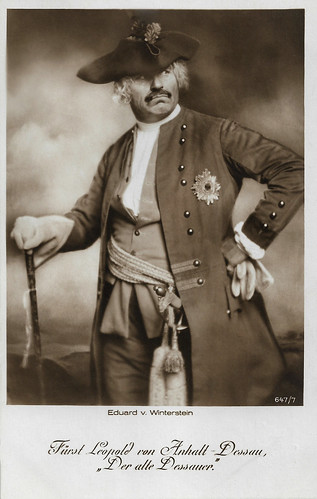
German postcard by W.J. Morlins, Berlin / Ross Verlag, no. 647/7. Photo: Karl Schenker / Cserépy-Film Co. Publicity still for Eduard von Winterstein as Leopold I, Prince of Anhalt-Dessau in Fridericus Rex (Arzén von Cserépy, 1922-1923). Caption: Fürst Leopold von Anhalt-Dessau, "Der alte Dessauer" (Leopold I, Prince of Anhalt-Dessau, "the old Dessauer").
Leopold I, Prince of Anhalt-Dessau (1676–1747) was a German prince of the House of Ascania and ruler of the principality of Anhalt-Dessau from 1693 to 1747. He was also a Generalfeldmarschall in the Prussian army. Nicknamed 'the Old Dessauer' (German: der alte Dessauer), he possessed good abilities as a field commander, but was mainly remembered as a talented drillmaster who modernised the Prussian infantry. Appointed by Frederick I to the rank of field marshal in 1712, Leopold distinguished himself for his success during the War of the Spanish Succession. He was later appointed the commander of the Prussian-Saxon army during the Great Northern War against Sweden. Leopold was a personal friend of Frederick I. The last great achievement of his military career was commanding the Prussian troops to victory over the Saxons at the Battle of Kesselsdorf in 1745 during the Second Silesian War.
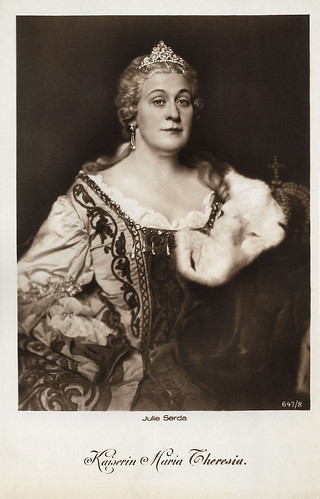
German postcard by W.J. Morlins, Berlin / Ross Verlag, Berlin, no. 647/8. Photo: Karl Schenker / Cserépy-Film Co. Publicity still of Julia (here: Julie) Serda as the Empress Maria Theresia of Austria in Fridericus Rex (Arzén von Cserépy, 1922-1923)
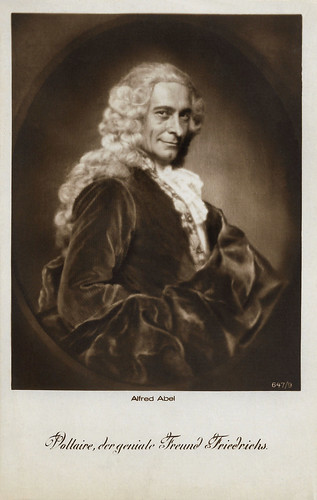
German postcard by W.J. Morlins, Berlin / Ross Verlag, Berlin, no. 647/9. Photo: Karl Schenker / Cserépy-Film Co. Publicity still of Alfred Abel as 'Voltaire, the genial friend of Frederick [the Great]' in the Fridericus Rex series (Arzén von Cserépy, 1922-1923). Alfred Abel is not listed at IMDb as playing Voltaire in any of the Frederick the Great films, but the back of this postcard states this was the case.
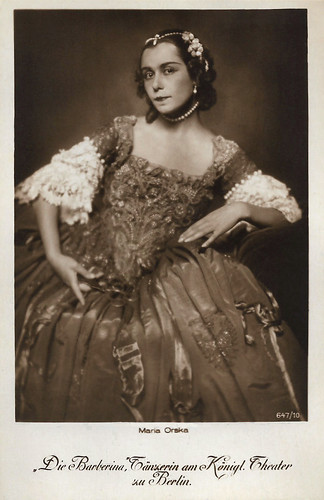
German postcard by W.J. Morlins, Berlin / Ross Verlag, Berlin, no. 647/10. Photo: Karl Schenker / Cserépy-Film Co. Publicity still of Maria Orska as the dancer Barberina of the Royal Theatre in Berlin in Fridericus Rex (Arzén von Cserépy, 1922-1923).
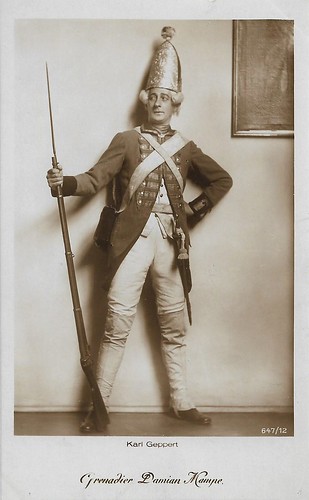
German postcard by W.J. Morlins, Berlin / Ross Verlag, Berlin, no. 647/ 12. Photo: Karl Schenker / Cserépy-Film Co. Publicity still of Karl Geppert as the grenadier Damian Mampe in Fridericus Rex (Arzén von Cserépy, 1922-1923)
Fridericus Rex (1922-1923) was a series of four German silent historical films about Friedrich II of Prussia (Frederick the Great) starring Otto Gebühr as the king and Albert Steinrück as his father, Friedrich Wilhelm I. The four films are Fridericus Rex - 1. Teil: Sturm und Drang (1922) about his early life, his love of music and his father's displeasure with it; Fridericus Rex - 2. Teil: Vater und Sohn (1922) about his marriage to Elisabeth-Christine von Braunschweig-Bevern (Erna Morena), and the death of his father following which he becomes king; Fridericus Rex - 3. Teil: Sanssouci (1923) in which Friedrich befriends the French philosopher Voltaire (Alfred Abel) and he realises a long held dream by building the castle of Sanssouci; and Fridericus Rex - 4. Teil: Schicksalswende (1923), which shows the king as the man who leads the Prussian army to the ultimate victory in the seven-years-war.
All four films were directed and produced by Arzén von Cserépy (1881–1958). Von Cserépy was a Hungarian screenwriter, film producer and director who was based in Germany. He ran his own production company Cserépy-Film until it was merged into the larger UFA empire. The first film's sets were designed by the art directors Hans Dreier and Ernö Metzner. The first film was shot at the Johannisthal Studios in Berlin. Location filming took place at the Charlottenburg Palace and other sites around historic Brandenburg.
Ross Verlag published two beautiful series of sepia postcards on Fridericus Rex. Ross mentions a trilogy of films on the flip side of the cards and probably this was changed by Von Csérepy during the production of the films. The first series of postcards, the portraits in the style of 18th century portraits, were co-published by Berlin-based W.J. Morlins. The other series with film stills was published by Ross solely. Portraits and stills were made by Karl Schenker, whose Atelier Schenker was one of the most famous German photo studios between the early 1910s and early 1930s. When the Nazis took the power in 1933, the Jewish Schenker could not stay in Berlin. He emigrated to England in 1938. There he opened a studio in London on Regent Street and he died in the British capital in 1954. Check out our earlier post on Atelier Schenker.
Otto Gebühr had been playing in films since 1913, but was known as a character actor in supporting roles. He had played Friedrich II once before in the film Die Tänzerin Barberina/The Dancer Barbarina (Carl Boese, 1920) with Lyda Salmonova in the title role. Due to his uncanny resemblance to the famous monarch, Gebühr was also cast in Fridericus Rex (1922). The film was immensely popular, and was soon followed by three sequels, all starring Gebühr. The series launched the Prussian film as a major German genre during the Weimar era. Gebühr went on to impersonate Friedrich II in 16 films and numerous stage performances.
Throughout World War II, Adolph Hitler often compared himself to Frederick the Great. Hitler kept an oil painting of Anton Graff's portrait of Frederick with him to the end in the Führer bunker in Berlin. British-American historian Gordon A. Craig relates that to help legitimise Nazi rule, Propaganda Minister Joseph Goebbels commissioned artists to render fanciful images of Frederick, Bismarck, and Hitler together to postulate a historical continuum between them. In 1942, Goebbels gave the assignment to make the film drama Der Große König/The Great King (1942), to be directed by Veit Harlan. Once again Otto Gebühr starred as Frederick the Great. The film received the rare 'Film of the Nation' distinction of the Nazi government.
Is there a (cinematic) historical continuum between Frederick the Great and Hitler? Following the collapse of the Nazi regime and the Allied Occupation of Germany in 1945, strict rules were enacted concerning German films and any perceived promotion of German ultra-nationalism which might lead to a revival of Nazism was outlawed. This effectively ended the cycle of Prussian films, although films set in the Prussian-era continued.
Nowadays Frederick is generally held in high regard, according to Wikipedia, especially for his statesmanship – and for his enlightened reforms that positively changed not only Germany but European society in general. German intellectuals even assert that the revolutions in both France and America were to some extent 'belated' attempts to 'catch up with Prussia'. The early Prussian films are no longer seen as prefiguring the rise of Nazism. The Fridericus Rex films represented a nostalgic wish for a restored monarchy.
Tomorrow and the day after, EFSP will do two more posts with postcards on Prussian films from the Weimar era, featuring Otto Gebühr as King Friedrich II. Tomorrow follows a post on the silent film Die Mühle von Sanssouci/The Mill at Sanssouci (1926) directed by Siegfried Philippi and Friedrich (Frederic) Zelnik. On Wednesday, we finish this short series with the early sound film Das Flötenkonzert von Sans-souci/The Flute Concert of Sanssouci (1930) directed by Gustav Ucicky.
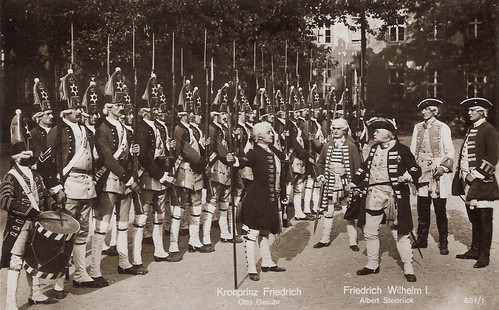
German postcard by Ross Verlag, Berlin, no. 651/1. Photo: Karl Schenker / Cserépy-Film Co. Publicity still of Otto Gebühr as crown prince Friedrich (Frederick, the future Frederick the Great), and Albert Steinrück as his father Friedrich Wilhelm I in the Fridericus Rex series (Arzén von Cserépy, 1922-1923).
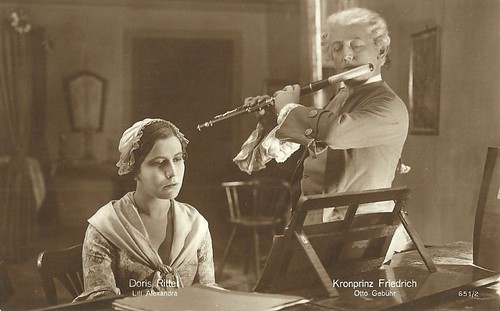
German postcard by Ross Verlag, no. 651/2. Photo: Karl Schenker / Cserépy-Film Co. Publicity still for Otto Gebühr as crown prince Frederick (the future Frederick II) and Lili Alexander as Doris Ritter in Fridericus Rex (Arzén von Cserépy, 1922-1923).
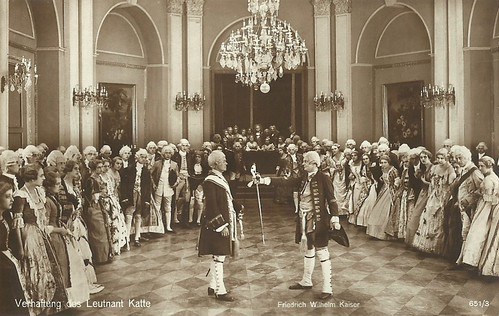
German postcard by Ross Verlag, no. 651/3. Photo: Karl Schenker / Cserépy-Film Co. Publicity still for Fridericus Rex (Arzén von Cserépy, 1922-1923), with Friedrich Wilhelm Kaiser as Lt. Katte. Caption: Verhaftung des Leutnant Katte (Arrest of Lt. Katte).
Hans Hermann von Katte was a Lieutenant of the Prussian Army, and a friend, tutor and possible lover of the future King Frederick II of Prussia, who was at the time the Crown Prince. He had helped Frederick with a - failed - plan of letting the crown prince escape to Paris, to flee the stern, military education of his father, King Frederick William of Prussia. The plot was betrayed, Katte was arrested and executed to set an example. Some researchers consider the king suspected Katte had seduced the crown prince and thus tried to ban his son's homosexual inclinations by killing of Katte. In Fridericus Rex Katte was played by actor Friedrich Wilhelm Kaiser.
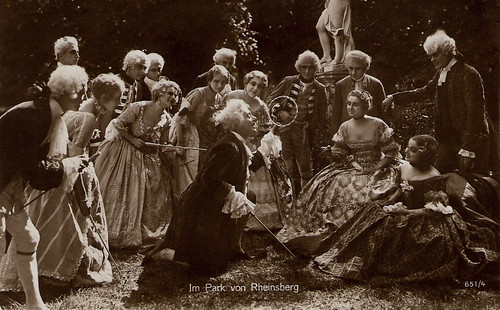
German postcard by Ross Verlag, no. 651/4, sent by mail in 1922. Photo: Karl Schenker / Cserépy-Film Co. Still for Fridericus Rex (Arzén von Cserépy, 1922-1923), with Otto Gebühr. Caption: Im Park von Rheinsberg (In the Park of Rheinsberg). From 1734 to his crowning to King of Prussia in 1740, Frederick the Great lived happily at Rheinsberg Palace with his wife Elisabeth.
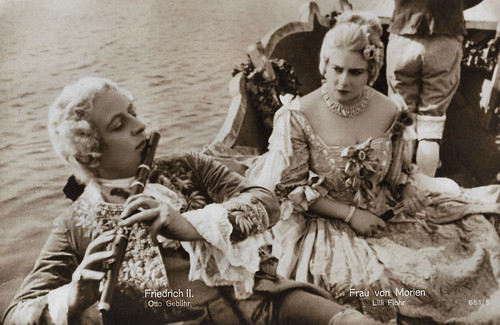
German postcard by Ross Verlag, no. 651/5. Photo: Karl Schenker / Cserépy-Film Co. Still for Fridericus Rex (Arzén von Cserépy, 1922-1923), with Otto Gebühr as Frederick II and Lilly Flohr as Frau von Morriën.
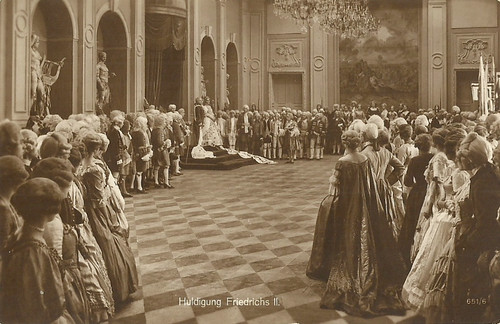
German postcard by Ross Verlag, no. 651/6. Photo: Karl Schenker / Cserépy-Film Co. Still for Fridericus Rex (Arzén von Cserépy, 1922-1923). Caption: 'Huldigung Friedrichs II'. (The inauguration of Frederick II in 1740 as king of Prussia.)
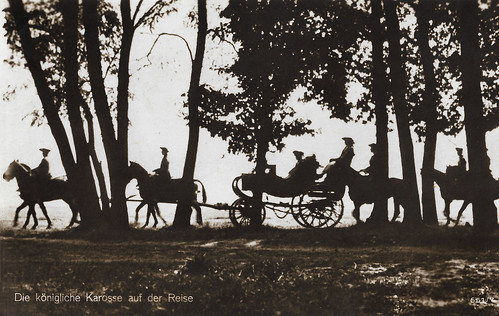
German postcard by Ross Verlag, no. 651/7. Photo: Karl Schenker / Cserépy-Film Co. Still for Fridericus Rex (Arzén von Cserépy, 1922-1923). Caption: 'Die königliche Karosse au der Reise' (The royal carriage on the journey).
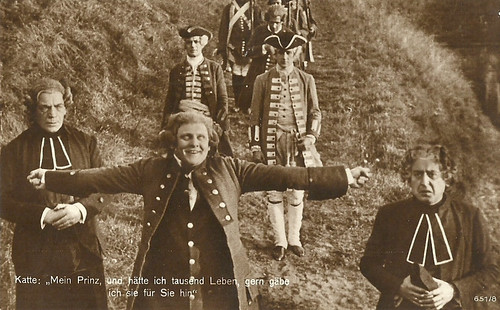
German postcard by Ross Verlag, no. 651/8. Photo: Karl Schenker / Cserépy-Film Co. Still for Fridericus Rex (Arzén von Cserépy, 1922-1923), with Friedrich Wilhelm Kaiser as Lt. Katte. Caption: 'Katte: "Mein Prinz, und hätte ich tausend Leben, gern gäbe ich sie für Sie hin.' (Katte: My Prince, even if I had a thousand lives, I gladly gave them all away for you).
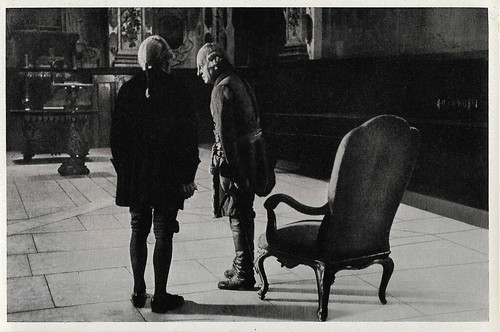
German collectors card by Ross Verlag in the series Vom Werden Deutscher Filmkunst - Der Stumme Film, picture no. 73, group 43. Photo: Ufa. Publicity still for Fridericus Rex (Arzén von Cserépy, 1922-1923).
Sources: Wikipedia and IMDb.

German postcard by W.J. Morlins, Berlin / Ross Verlag, Berlin, no. 647/1. Photo: Karl Schenker / Cserépy-Film Co. Publicity still of Albert Steinrück as Friedrich Wilhelm I, King of Prussia, the father of Frederick the Great, in Fridericus Rex (Arzén von Cserépy, 1922-1923).

German postcard by W.J. Morlins, Berlin / Ross Verlag, Berlin, no. 647/2. Photo: Karl Schenker / Cserépy-Film Co. Publicity still of Otto Gebühr as Crown Prince Frederick for Fridericus Rex (Arzén von Cserépy, 1922-1923).

German postcard by W.J. Morlins, Berlin / Ross Verlag, Berlin, no. 647/3. Photo: Karl Schenker / Cserépy Film Co. Publicity still of Charlotte Schulz as Wilhelmine, Marchioness of Bayreuth, favourite sister of Frederick the Great, in Fridericus Rex (Arzén von Cserépy, 1922-1923).

German postcard by W.J. Morlins, Berlin / Ross Verlag, Berlin, no. 647/4. Photo: Karl Schenker / Cserépy-Film Co. Publicity still of Erna Morena as Queen Elisabeth Christine, spouse of Frederick the Great, in Fridericus Rex (Arzén von Cserépy, 1922-1923).

German postcard by W.J. Morlins, Berlin / Ross Verlag, Berlin, no. 647/5. Photo: Karl Schenker / Cserépy-Film Co. Publicity still of Otto Gebühr as King Frederick the Great in Fridericus Rex (Arzén von Cserépy, 1922-1923).
The Old Fritz
Friedrich II or in English Frederick II (1712-1786) was King of Prussia from 1740 until 1786, the longest reign of any Hohenzollern king. His most significant accomplishments during his reign included his military victories, his reorganisation of Prussian armies, his patronage of the arts and the Enlightenment, and his final success against great odds in the Seven Years' War. Frederick was the last Hohenzollern monarch titled King in Prussia and declared himself 'King of Prussia' after achieving sovereignty over most historically Prussian lands in 1772. Prussia had greatly increased its territories and became a leading military power in Europe under his rule. He became known as 'Frederick the Great' (Friedrich der Große), and was nicknamed 'Der Alte Fritz' (The Old Fritz) by the Prussian people, and eventually the rest of Germany.
In his youth, Frederick was more interested in music and philosophy than the art of war. Nonetheless, upon ascending to the Prussian throne, he attacked Austria and claimed Silesia during the Silesian Wars, winning military acclaim for himself and Prussia. Toward the end of his reign, Frederick physically connected most of his realm by acquiring Polish territories in the First Partition of Poland. He was an influential military theorist whose analysis emerged from his extensive personal battlefield experience and covered issues of strategy, tactics, mobility and logistics.
Considering himself 'the first servant of the state', Frederick was a proponent of enlightened absolutism. He modernised the Prussian bureaucracy and civil service and pursued religious policies throughout his realm that ranged from tolerance to segregation. He reformed the judicial system and made it possible for men not of noble stock to become judges and senior bureaucrats. Frederick also encouraged immigrants of various nationalities and faiths to come to Prussia. Some critics, however, point out his oppressive measures against conquered Polish subjects during the First Partition. Frederick supported arts and philosophers he favoured, as well as allowing complete freedom of the press and literature. Frederick is buried at his favourite residence, Sanssouci in Potsdam. Because he died childless, Frederick was succeeded by his nephew, Frederick William II, son of his brother, Augustus William.
Nearly all 19th-century German historians made Frederick into a romantic model of a glorified warrior, praising his leadership, administrative efficiency, devotion to duty and success in building up Prussia to a great power in Europe. Historian Leopold von Ranke was unstinting in his praise of Frederick's "heroic life, inspired by great ideas, filled with feats of arms ... immortalised by the raising of the Prussian state to the rank of a power". Johann Gustav Droysen was even more extolling. Frederick remained an admired historical figure through the German Empire's defeat in the First World War. The Nazis glorified him as a great German leader pre-figuring Adolph Hitler, who personally idolised him. Associations with him became far less favourable after the fall of the Nazis, largely due to his status as one of their symbols.

German postcard by W.J. Morlins, Berlin / Ross Verlag, no. 647/6. Photo: Karl Schenker / Cserépy-Film Co. Publicity still for Georg John as Generalfeldmarschall von Zieten (Field Marshal von Zieten) in Fridericus Rex (Arzén von Cserépy, 1921-1922).
Hans Joachim von Zieten (1699-1786), also known as 'Zieten aus dem Busch', was a cavalry general in the Prussian Army. He served in four wars and was instrumental in several victories during the reign of Frederick the Great, most particularly at Hohenfriedberg and Torgau. He is also well known for a raid into the Holy Roman Empire during the Second Silesian War, known as 'Zieten's Ride'. After engaging in a reputed 74 duels, and fighting in four wars, he died in his bed at the age of 86.

German postcard by W.J. Morlins, Berlin / Ross Verlag, no. 647/7. Photo: Karl Schenker / Cserépy-Film Co. Publicity still for Eduard von Winterstein as Leopold I, Prince of Anhalt-Dessau in Fridericus Rex (Arzén von Cserépy, 1922-1923). Caption: Fürst Leopold von Anhalt-Dessau, "Der alte Dessauer" (Leopold I, Prince of Anhalt-Dessau, "the old Dessauer").
Leopold I, Prince of Anhalt-Dessau (1676–1747) was a German prince of the House of Ascania and ruler of the principality of Anhalt-Dessau from 1693 to 1747. He was also a Generalfeldmarschall in the Prussian army. Nicknamed 'the Old Dessauer' (German: der alte Dessauer), he possessed good abilities as a field commander, but was mainly remembered as a talented drillmaster who modernised the Prussian infantry. Appointed by Frederick I to the rank of field marshal in 1712, Leopold distinguished himself for his success during the War of the Spanish Succession. He was later appointed the commander of the Prussian-Saxon army during the Great Northern War against Sweden. Leopold was a personal friend of Frederick I. The last great achievement of his military career was commanding the Prussian troops to victory over the Saxons at the Battle of Kesselsdorf in 1745 during the Second Silesian War.

German postcard by W.J. Morlins, Berlin / Ross Verlag, Berlin, no. 647/8. Photo: Karl Schenker / Cserépy-Film Co. Publicity still of Julia (here: Julie) Serda as the Empress Maria Theresia of Austria in Fridericus Rex (Arzén von Cserépy, 1922-1923)

German postcard by W.J. Morlins, Berlin / Ross Verlag, Berlin, no. 647/9. Photo: Karl Schenker / Cserépy-Film Co. Publicity still of Alfred Abel as 'Voltaire, the genial friend of Frederick [the Great]' in the Fridericus Rex series (Arzén von Cserépy, 1922-1923). Alfred Abel is not listed at IMDb as playing Voltaire in any of the Frederick the Great films, but the back of this postcard states this was the case.

German postcard by W.J. Morlins, Berlin / Ross Verlag, Berlin, no. 647/10. Photo: Karl Schenker / Cserépy-Film Co. Publicity still of Maria Orska as the dancer Barberina of the Royal Theatre in Berlin in Fridericus Rex (Arzén von Cserépy, 1922-1923).

German postcard by W.J. Morlins, Berlin / Ross Verlag, Berlin, no. 647/ 12. Photo: Karl Schenker / Cserépy-Film Co. Publicity still of Karl Geppert as the grenadier Damian Mampe in Fridericus Rex (Arzén von Cserépy, 1922-1923)
A historical continuum between Frederick the Great and Hitler?
Fridericus Rex (1922-1923) was a series of four German silent historical films about Friedrich II of Prussia (Frederick the Great) starring Otto Gebühr as the king and Albert Steinrück as his father, Friedrich Wilhelm I. The four films are Fridericus Rex - 1. Teil: Sturm und Drang (1922) about his early life, his love of music and his father's displeasure with it; Fridericus Rex - 2. Teil: Vater und Sohn (1922) about his marriage to Elisabeth-Christine von Braunschweig-Bevern (Erna Morena), and the death of his father following which he becomes king; Fridericus Rex - 3. Teil: Sanssouci (1923) in which Friedrich befriends the French philosopher Voltaire (Alfred Abel) and he realises a long held dream by building the castle of Sanssouci; and Fridericus Rex - 4. Teil: Schicksalswende (1923), which shows the king as the man who leads the Prussian army to the ultimate victory in the seven-years-war.
All four films were directed and produced by Arzén von Cserépy (1881–1958). Von Cserépy was a Hungarian screenwriter, film producer and director who was based in Germany. He ran his own production company Cserépy-Film until it was merged into the larger UFA empire. The first film's sets were designed by the art directors Hans Dreier and Ernö Metzner. The first film was shot at the Johannisthal Studios in Berlin. Location filming took place at the Charlottenburg Palace and other sites around historic Brandenburg.
Ross Verlag published two beautiful series of sepia postcards on Fridericus Rex. Ross mentions a trilogy of films on the flip side of the cards and probably this was changed by Von Csérepy during the production of the films. The first series of postcards, the portraits in the style of 18th century portraits, were co-published by Berlin-based W.J. Morlins. The other series with film stills was published by Ross solely. Portraits and stills were made by Karl Schenker, whose Atelier Schenker was one of the most famous German photo studios between the early 1910s and early 1930s. When the Nazis took the power in 1933, the Jewish Schenker could not stay in Berlin. He emigrated to England in 1938. There he opened a studio in London on Regent Street and he died in the British capital in 1954. Check out our earlier post on Atelier Schenker.
Otto Gebühr had been playing in films since 1913, but was known as a character actor in supporting roles. He had played Friedrich II once before in the film Die Tänzerin Barberina/The Dancer Barbarina (Carl Boese, 1920) with Lyda Salmonova in the title role. Due to his uncanny resemblance to the famous monarch, Gebühr was also cast in Fridericus Rex (1922). The film was immensely popular, and was soon followed by three sequels, all starring Gebühr. The series launched the Prussian film as a major German genre during the Weimar era. Gebühr went on to impersonate Friedrich II in 16 films and numerous stage performances.
Throughout World War II, Adolph Hitler often compared himself to Frederick the Great. Hitler kept an oil painting of Anton Graff's portrait of Frederick with him to the end in the Führer bunker in Berlin. British-American historian Gordon A. Craig relates that to help legitimise Nazi rule, Propaganda Minister Joseph Goebbels commissioned artists to render fanciful images of Frederick, Bismarck, and Hitler together to postulate a historical continuum between them. In 1942, Goebbels gave the assignment to make the film drama Der Große König/The Great King (1942), to be directed by Veit Harlan. Once again Otto Gebühr starred as Frederick the Great. The film received the rare 'Film of the Nation' distinction of the Nazi government.
Is there a (cinematic) historical continuum between Frederick the Great and Hitler? Following the collapse of the Nazi regime and the Allied Occupation of Germany in 1945, strict rules were enacted concerning German films and any perceived promotion of German ultra-nationalism which might lead to a revival of Nazism was outlawed. This effectively ended the cycle of Prussian films, although films set in the Prussian-era continued.
Nowadays Frederick is generally held in high regard, according to Wikipedia, especially for his statesmanship – and for his enlightened reforms that positively changed not only Germany but European society in general. German intellectuals even assert that the revolutions in both France and America were to some extent 'belated' attempts to 'catch up with Prussia'. The early Prussian films are no longer seen as prefiguring the rise of Nazism. The Fridericus Rex films represented a nostalgic wish for a restored monarchy.
Tomorrow and the day after, EFSP will do two more posts with postcards on Prussian films from the Weimar era, featuring Otto Gebühr as King Friedrich II. Tomorrow follows a post on the silent film Die Mühle von Sanssouci/The Mill at Sanssouci (1926) directed by Siegfried Philippi and Friedrich (Frederic) Zelnik. On Wednesday, we finish this short series with the early sound film Das Flötenkonzert von Sans-souci/The Flute Concert of Sanssouci (1930) directed by Gustav Ucicky.

German postcard by Ross Verlag, Berlin, no. 651/1. Photo: Karl Schenker / Cserépy-Film Co. Publicity still of Otto Gebühr as crown prince Friedrich (Frederick, the future Frederick the Great), and Albert Steinrück as his father Friedrich Wilhelm I in the Fridericus Rex series (Arzén von Cserépy, 1922-1923).

German postcard by Ross Verlag, no. 651/2. Photo: Karl Schenker / Cserépy-Film Co. Publicity still for Otto Gebühr as crown prince Frederick (the future Frederick II) and Lili Alexander as Doris Ritter in Fridericus Rex (Arzén von Cserépy, 1922-1923).

German postcard by Ross Verlag, no. 651/3. Photo: Karl Schenker / Cserépy-Film Co. Publicity still for Fridericus Rex (Arzén von Cserépy, 1922-1923), with Friedrich Wilhelm Kaiser as Lt. Katte. Caption: Verhaftung des Leutnant Katte (Arrest of Lt. Katte).
Hans Hermann von Katte was a Lieutenant of the Prussian Army, and a friend, tutor and possible lover of the future King Frederick II of Prussia, who was at the time the Crown Prince. He had helped Frederick with a - failed - plan of letting the crown prince escape to Paris, to flee the stern, military education of his father, King Frederick William of Prussia. The plot was betrayed, Katte was arrested and executed to set an example. Some researchers consider the king suspected Katte had seduced the crown prince and thus tried to ban his son's homosexual inclinations by killing of Katte. In Fridericus Rex Katte was played by actor Friedrich Wilhelm Kaiser.

German postcard by Ross Verlag, no. 651/4, sent by mail in 1922. Photo: Karl Schenker / Cserépy-Film Co. Still for Fridericus Rex (Arzén von Cserépy, 1922-1923), with Otto Gebühr. Caption: Im Park von Rheinsberg (In the Park of Rheinsberg). From 1734 to his crowning to King of Prussia in 1740, Frederick the Great lived happily at Rheinsberg Palace with his wife Elisabeth.

German postcard by Ross Verlag, no. 651/5. Photo: Karl Schenker / Cserépy-Film Co. Still for Fridericus Rex (Arzén von Cserépy, 1922-1923), with Otto Gebühr as Frederick II and Lilly Flohr as Frau von Morriën.

German postcard by Ross Verlag, no. 651/6. Photo: Karl Schenker / Cserépy-Film Co. Still for Fridericus Rex (Arzén von Cserépy, 1922-1923). Caption: 'Huldigung Friedrichs II'. (The inauguration of Frederick II in 1740 as king of Prussia.)

German postcard by Ross Verlag, no. 651/7. Photo: Karl Schenker / Cserépy-Film Co. Still for Fridericus Rex (Arzén von Cserépy, 1922-1923). Caption: 'Die königliche Karosse au der Reise' (The royal carriage on the journey).

German postcard by Ross Verlag, no. 651/8. Photo: Karl Schenker / Cserépy-Film Co. Still for Fridericus Rex (Arzén von Cserépy, 1922-1923), with Friedrich Wilhelm Kaiser as Lt. Katte. Caption: 'Katte: "Mein Prinz, und hätte ich tausend Leben, gern gäbe ich sie für Sie hin.' (Katte: My Prince, even if I had a thousand lives, I gladly gave them all away for you).

German collectors card by Ross Verlag in the series Vom Werden Deutscher Filmkunst - Der Stumme Film, picture no. 73, group 43. Photo: Ufa. Publicity still for Fridericus Rex (Arzén von Cserépy, 1922-1923).
Sources: Wikipedia and IMDb.
No comments:
Post a Comment